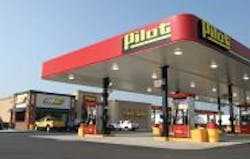“In the past, the coffee served on the interstate was often just an afterthought; you needed to have it, it needed to be hot, but the quality largely got ignored. We’re trying to change that.” –Tim Purcell, director of merchandising, Pilot Travel Centers
So I am trolling the Internet yesterday when the headline of a press release grabs my attention: Pilot Travel Centers boasts that it offers “The Best Coffee on the Interstate.”
WHOA! Here’s what my good friend and editorial compatriot David Cullen aptly described as “a high-hat claim” if there ever was one! Not just “good” coffee, mind you; not even “great” for that matter. But the very BEST coffee you can get out on the highway today.
Being a coffee fanatic myself (and currently sipping on a hot cup of medium roast from Dunkin Donuts, which, by the way, was rated ‘the best coffee’ by the owner-operators working for Atlas Van Lines), I couldn’t resist the chance to talk the good folks at Pilot to see why they hold their particular blends of java in such lofty esteem.
“We started this process back in 2003, to take our coffee from ‘typical’ past ‘great’ and right on up to ‘superb’ in our estimation,” Tim Purcell, Pilot’s director of merchandising, told me. “Many segments of our customer base enjoy coffee – professional truck drivers, vacationing families, the long distance business traveler, and the local population surrounding each of our locations. We also felt that improving our coffee quality would make us more of a ‘destination’ in the minds of more highway travelers, too.”
It’s an effort Pilot invested a lot of time and money into as well, Tim told me. For starters, away went the old three-gallon coffee brewing “urns” so ubiquitous across the fast food industry, replaced by upwards of eight Bunn brand “soft heat” brewers that not only make coffee in smaller, more tasty batches but keep the java at an even temperature so it does not “cook” the coffee post-brewing.
Sounds simple, but then remember Pilot operates 300 retail sites in 41 states – you can’t just run out and swap out the coffee stations in a day with this kind of national footprint.
More coffee is now used to produce the premium blends, too, with Pilot employees trained only to let brewed coffee sit for an hour before disposing of it. The company has also added a “condiment” station packed with five to six different flavors of coffee creamer, along with chilled cream and a variety of artificial and natural sweetners. Along with the investment in new equipment, all of that has added 50% to the cost of Pilot’s coffee operation, said Purcell – yet Pilot hasn’t raised the costs of its coffee, he stressed.
After much research and sampling, Pilot’s settled on several blends to round out its “best highway coffee” offerings. There’s the standard “Pilot House Blend,” a mild roast crafted to appeal to any palate, followed by 100% Arabica dark roast blend for those seeking a bit more “bite” in their brew, alongside a hazelnut flavored coffee offering.
Next are the “origin” premium blends, made from 100% Columbian, 100% Costa Rica and 100% Sumatra beans. These blends produce unique flavors and tastes, designed to appeal to those more rarified highway palates, noted Purcell. “Our Costa Rica blend is my favorite,” he told me. “It’s really rich with a smooth taste. I like it with a little cream and a little sugar; raw sugar, if I can get it.”
Pilot is so juiced about its “best coffee” that it’s dedicated a Facebook fan page and Twitter account to its java. “This is a way for us to create a ‘real-time’ conversation with our customers, with our coffee as the starting point,” Lyndsay Caylor, Pilot’s social media manager, told me. “It’s about providing a forum so we can listen to the customer’s wants and needs and adjust our offerings as needed.”
[Lyndsay, by the way, prefers Pilot’s Arabica dark roast coffee, with a little French vanilla creamer to take the edge off its slightly bitter flavor. Arabica is typically made from many different beans grown at high altitude to provide a strong but not too bitter bite to the coffee.]
Purcell said customers can also use the company’s Facebook site to take a poll about which Pilot coffee blend is their favorite. In conjunction with the launch of the coffee-focused Facebook page and Twitter account, Pilot is also offering an in-store sweepstakes for lucky customers to win free coffee for a year. Customers can complete and submit a ballot at any Pilot location during the month of January. Six entries at each travel center – more than 1,800 customers – will be selected to win a year of free Pilot coffee, Purcell said.
In addition to coffee, Pilot is unveiling six up-scale Revolution Teas and plans to roll out some new breakfast items it’s found are popular with coffee drinkers – such as oatmeal, apparently. [I thought doughnuts would be at the top of any such “breakfast food” list myself, but they’ve become 'cibus non gratae ' these days to paraphrase an old Latin phrase – a most unwelcome food.]
Now, however, comes the tough part – is Pilot’s java truly “the very best” to be found on the highway? Time – and much indulging by this reporter – will only tell!
